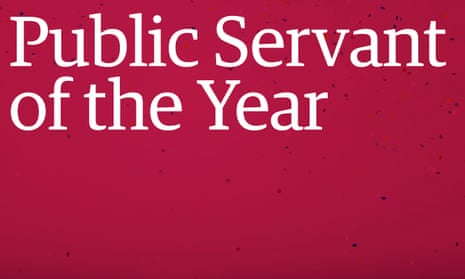Five public servants have been shortlisted for this year’s prestigious Public Servant of the Year award, which is now open online for public vote.
Voting closes at midnight on 30 September 2016, You may vote only once.
The winner will be announced at the Public Service Awards ceremony in November 2016 and a special supplement will be published online and in the paper on 30 November 2016.
The shortlist:
Helen Backus
Commissioning manager, Buckinghamshire county council
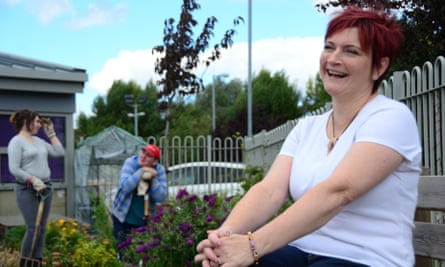
An ex-RAF medic, Helen Backus became commissioning manager for young people at Buckinghamshire county council five years ago. At that time, 90% of young people with disabilities or additional needs who wanted to access post-16 education had to move outside the county, far away from their homes.
Thanks to the Bucks’ Life Skills Centres Backus pioneered, that figure has been cut to 10%, helping more than 200 young people since 2012. “Uprooting a young person with autism and shipping them out miles away can be a gut-wrenching experience and a lot of them were the failing and going into crisis and needing a lot more support once they came back home,” she explains.
Backus put together a business case for offering specialist college units in the county, got local colleges onboard and convinced a cash-strapped council to build them using limited reserves. The first, Aylesbury Life Skills College, was funded by the department of education, Aylesbury College and Buckinghamshire county council in 2012 and a second unit in Flackwell Heath opened earlier this year.
“I love hearing what the students are doing now, these are children who had been written off - for example, one was told he’d never be able to independently travel, now he can read timetables and travels all over the country on local transport.”
The initiative has been so successful that 12 other councils are now looking to set up something similar, with Milton Keynes and Harrow recently opening their own centres. Backus also advises parliament on transition in education as part of the All Party Parliamentary Advisory Groups for autism and learning difficulties.
“I don’t know anyone who works for a local authority and just does their hours, but 50 hours will only feel like 15 if you’re in the right place,” she says.
Mary Burch
Divisional secretary, Soldiers’ and Sailors’ Families Association (SSAFA), Dunbartonshire
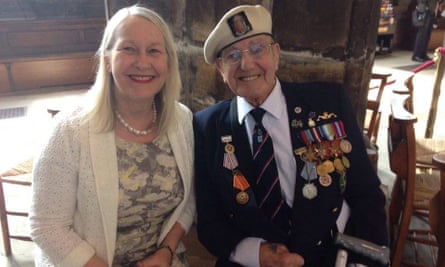
Mary Burch has spent the past seven years as divisional secretary of the Dunbartonshire branch of the Solders’ and Sailors’ Families Association, SSAFA, the UK’s oldest armed forces charity for veterans. But according to her nominee, Burch’s job title doesn’t do justice to just how much she does for the charity, particularly in the past two years when a severe lack of volunteers has seen Burch single-handedly take on 70% of all casework, to make sure no veteran is left disadvantaged or suffering. This is on top of doing the branch’s administration, fundraising, recruitment and training.
“Holding things together to keep the charity going locally has been hard but absolutely wonderful; I could cry now thinking about the desperate situation some people are in when they come to us for help, it’s a real eye-opener which changes you forever” says Burch, who initially signed up for a couple of hours a week and is now volunteering up to 32 hours.
The Dunbartonshire branch deals with as many of 75 cases a year, including veterans with post traumatic stress disorder, drug or alcohol issues, homelessness, financial difficulties and countless other problems. It could be taking someone to the supermarket to buy them emergency food supplies, or finding the funds to buy them a handrail to better get around the house.
Burch, who has volunteered with charities since she was 16, has been working closely with local prisons to help support veterans into housing and employment once they are released and this summer helped to secure £20,000 in funding from Poppy Scotland and various naval charities to buy an adapted van to enable a quadriplegic veteran to get out of the house and into the fresh air with his wife.
“My son taught me a phrase - pay it forward; if you make a difference to one person’s life it ripples out. I wish I had found SSAFA a long time ago.”
Les Nicoll
Community builder, Essex County Fire & Rescue Service

Les Nicoll has been with the Essex Fire Service for 47 years, the last four as a community builder, promoting support and safety for vulnerable people within Essex and forging links with other local services.
He is particularly proud of the work he does in Jaywick, one of the most deprived towns in the country, where he is known as “the big fireman”, Nicoll says “sadly, most residents in Jaywick don’t engage readily with public services, and yet their homes and lifestyle can present a massive fire and life risk.”
Nicoll has twice knocked on every door in the town to give home fire safety visits and fit smoke alarms. “At one time, this resulted in me being able to supply and fit over 300 homes with free smoke alarms.”
But Nicoll’s work has extended beyond just fire safety and includes setting up local food banks to support the homeless, organising speed-dating networks for organisations to share contacts and running a monthly ‘walk and talk’ event for isolated people with mental health issues.
He also created a “winter warmers” drive for donations of warm clothes for people living below the poverty line, and set up a pop-up shop in a local fire station to distribute the clothes to more than 250 people. All these initiatives have been created with minimal funding, but have required time and innovation.
Other agencies call on Nicoll, who always wears his firefighter’s uniform at work, for help because, as he himself explains, the great thing about being part of the fire service is that people will trust you and let you in. “I get great peace of mind from keeping people safe and I guarantee getting involved in your community will make you feel good too.”
John Shaddick
Service manager, Avon and Somerset Police/Catch22
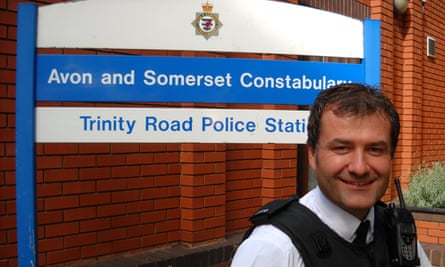
The Bright Outlook programme for which John Shaddick has been nominated started life on a single street”: the notoriously crime-ridden Stapleton Road in east Bristol, where Shaddick was assigned as neighbourhood beat manager in 2014, to help change young people’s lives and reduce crime and antisocial behaviour.
“I quickly recognised there was a massive distrust of the police and that many of the young people being drawn into gang culture were just victims of circumstance. I wanted to understand why they were acting like they were and try and raise their aspirations,” he explains.
The engagement and mentoring programmes he subsequently built in schools and with partner agencies were so successful they have been taken on by charity Catch22, which is working in partnership with Bristol city council to tackle gang culture and get young people on the path to education and employment. Shaddick is on secondment with the charity from the police, and, together with his 13-strong team, supports over 200 young people per year.
Young people referred to the programme are given the chance to talk to serving prisoners and go through custody and court reenactments so they can see where their behaviour might lead to. According to Shaddick, 92% of those who have been through the programme have not come under the police radar since.
He’s also particularly proud of the Bristol Somali women’s group, and Coffee With a Cop, an initiative to enable parents - particularly those from BME communities - to talk to the police in a relaxed environment and share their concerns after dropping their children at school.
Shaddick joined Avon and Somerset Police 10 years ago at the age of 36, after more than a decade in the publishing industry. He only wishes he had made his career change sooner. “The satisfaction you get from having an impact on a young person’s life is worth more than money; it’s a gift.”
Adrian Treharne
Civil servant, Learning from experience team, Home Office
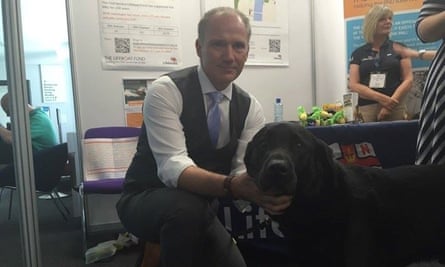
As a civil servant for 20 years, there are few parts of society that Adrian Treharne’s work has not reached. Nominated for “quietly delivering” UK public services and national strategies, as well as mentoring colleagues and people from underprivileged backgrounds, Treharne has taken on a multitude of endeavours since joining the civil service in 1996 as an administrative assistant.
Treharne has spent the past decade at the Home Office. His successful projects include managing a flagship bill on pensions - the Pensions Act 2004 - through parliament. After lots of back and forth and gruelling 17-hour days, Treharne’s efforts helped give rise to the Pension Protection Fund, which protects 90% of a person’s pension pot should their company go bust.
“Most people won’t know [the Pension Protection Fund] is there until they need it, but it’s there to protect and give peace of mind, especially with more companies folding today.” More than 11 million people are in the sort of pension schemes the fund protects, and at Treharne’s last count, it had come to the rescue of more than 200,000 people.
Treharne then went on to project manage legislation on regulatory reform to cut through red tape and allows changes to acts of parliament to be made without going through protracted bureaucracy. “It caused a lot of kerfuffle and a lot of correspondence, but we got there in the end,” he says.
Treharne has done a lot of mentoring for underprivileged young people and has a history of overcoming adversity himself. He was registered blind in 2011 and lives with bipolar and an anxiety disorder. Unperturbed, he’s gearing up to break a Guiness World water speed record to raise money for charity.
His advice to any young people starting out in a career in civil service is to remember that government doesn’t work in a bubble. “Talk to the people who are using the services you’re implementing and keep talking and learning from them.”
